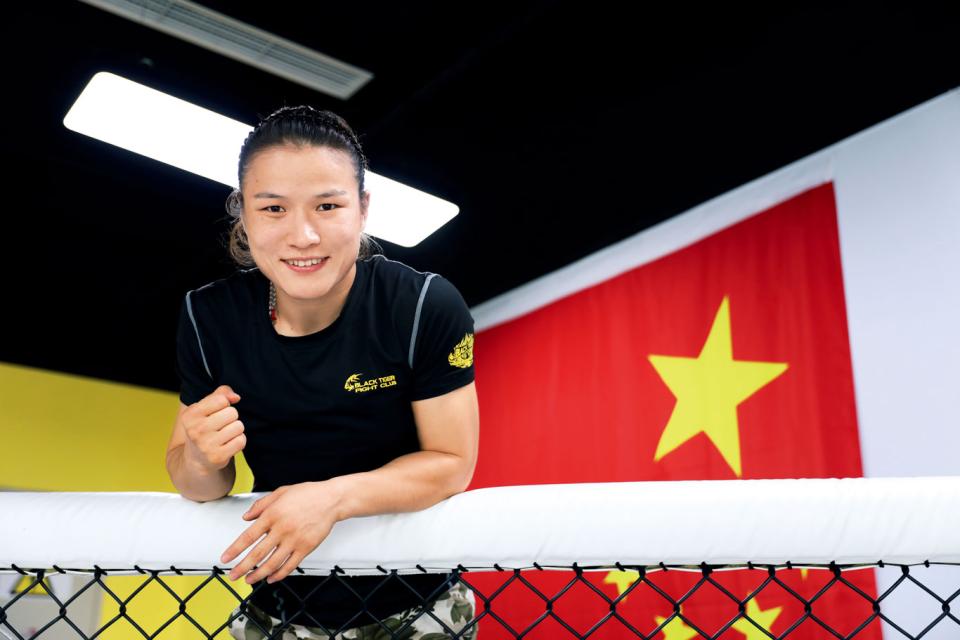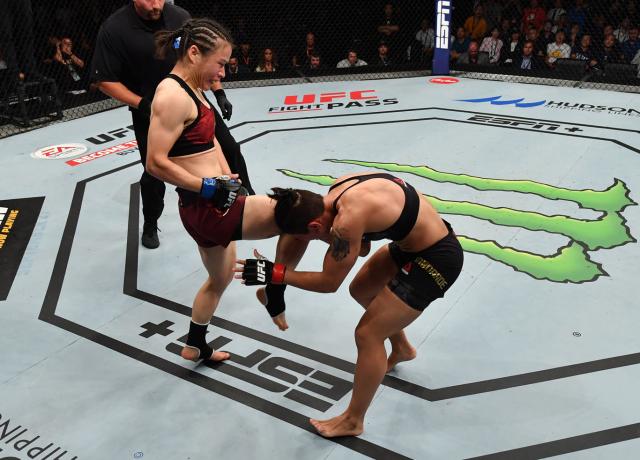In early September 2019, Zhang Weili and her coach were addressing guests at a victory banquet in Zhang’s honor at a rural restaurant in Shunyi District in Beijing. Their voices faded in and out because of sound equipment failures.
After the speech, Zhang toasted each guest and talked about the bout she dominated several days ago. “Before she entered the ring, she [Jessica Andrade] was staring at me accusingly for a long time. I shot her back a warning glance from the other side of the octagon,” Zhang said. “She was staring at me with an exaggerated expression, but the look in my eyes said I was about to wreck her. I felt I could win.”
On August 31, Zhang destroyed Brazilian strawweight queen Andrade with powerful punches in 42 seconds, becoming the Ultimate Fighting Championship (UFC) women’s strawweight champion and China’s first UFC champion at the Universiade Sports Center in Shenzhen, Guangdong Province. Chinese media was quick to crown Zhang as the country’s best female fighter.
Zhang’s journey to glory started when she was a child captivated by Chinese martial arts films in the 1990s. Martial arts films were popular then and Zhang was dreaming of becoming a superhero. “Back then, I thought I’d be able to fly if learned martial arts,” she told NewsChina.
Zhang was born in 1990 to a family of miners in a village in the city of Handan in Hebei Province. This is the cradle of Yang Family Tai Chi, an important genre of Chinese martial arts. Her family says she was always lively and active. Her brother Zhang Weifeng remembers that she used to jump from one house roof to another. Her shoes would wear out in a week. When she was six, she started studying martial arts with an old mentor in the village. To help her develop her physicality and acrobatic skills, her parents dug a pit in the courtyard that she practiced jumping out of.
At primary school, Zhang asked her parents to send her to a martial arts school. Her parents chose one in Handan, which had more than 300 students, including 20 girls who shared one dormitory. Conditions were harsh. At night, mice crept inside and the washbasins were frozen in winter.
There was no special treatment for girls. In the second week, Zhang was kicked in the back by another student and Zhang rushed at her in revenge. The coach saw and landed Zhang two blows with a stick. Another time, the coach asked the girls to run with the boys, and all the girls who lagged behind were slapped in the face.
Zhang never thought of leaving. “At that time, I thought it was normal for martial arts students to be beaten. There is no sweet without sweat,” she told our reporter.
In the first year at the school, all students had to practice basic combat skills. In the second year, the surviving students faced three options: learning sanda (Chinese kickboxing), taekwondo or performance martial arts. Most girls picked the last, because it is relatively easier and graduates are more likely to engage in the performance industry. Sanda is the most difficult, and students have to spend several hours practicing every day, often with a bloody nose and a swollen face.
Zhang made up her mind to learn sanda. At the age of 14, she became sanda champion of Hebei Province. Back then, there were three choices for top sanda graduates: to become an armed police officer, a professional in sanda, or go to college. At the recommendation of a previous graduate, Zhang became a member of the sanda team of Jiangsu Province in 2005. It was also in this year China started its first mixed martial arts (MMA) competition, the Art of War Fighting Championship, and a number of top sanda players became China’s first MMA competitors.
It is not easy to make a living in boxing, sanda and MMA. Zhang had a few matches a year when she was on the Jiangsu Province sanda team. Most competitors find it hard to land a decent job after they retire because of their poor educational background.
In 2008, sanda boxers were very popular in China because of the Olympic Games in Beijing, even though sanda was not part of the event. Zhang sustained an injury in the National Sanda Tournament and was unable to compete anymore. Her family advised her to take a break and she quit the team.
Zhang moved to Beijing, working different jobs, including supermarket cashier and kindergarten teacher. In 2010, she went to a gym to interview for a receptionist job and was delighted to find a beautiful ring inside. She agreed to work at the gym at once without negotiating a salary after being told she could use all the equipment for free.
On her first day, Zhang met Wu Haotian, a Chinese MMA pioneer who was practicing jujitsu. Zhang often practiced with Wu and improved her combat skills quickly. “Zhang had martial arts training and had a good foundation. She grasped the major skills of jujitsu within three months – it usually takes other people at least a year,” Wu told NewsChina.
One day, when Zhang was sparring with Wu, businessman Cai Xuejun happened to catch their training session. Cai ended up being Zhang’s agent and business partner, one of China’s first MMA agents. Cai said he was surprised to see that they fought with all their might, neither holding back.
“Her physical constitution and her competitiveness impressed me most. She had the makings of a very promising competitor if she had more tailored training,” Cai told our reporter.
At that time, some minor matches for female MMA players began to emerge in the Chinese mainland and Cai entered Zhang in an amateur competition. Before the bout, the organizer asked Zhang to get down to 56 kilograms, and Zhang spent three days attempting to make the weight. But she was taken aback to find that although her opponent was overweight, the competition was held as scheduled. Zhang lost the match – still the only loss she has experienced.
“She thought it was unfair and a great pity to lose the match,” Cai said. Afterward, Zhang posted an update on her Weibo account: “I believe as long as I persist, I will stand on the stage of the UFC.” Zhang later fought in some amateur matches, which eventually caught the attention of the ONE Championship, a mixed martial arts promotional event in Singapore. Zhang sought advice from Cai and was told that if she wanted to participate, she would have to resign from work and focus on training. Zhang quit her job as sales manager at the gym with a monthly salary of 20,000 yuan (US$2,820) to become a professional MMA fighter.
Nowadays, Zhang lives on the third floor of a villa in Shunyi District in Beijing which she rents with some colleagues. In the morning, she runs six kilometers and practices boxing for three hours. In the afternoon, she practices jujitsu and wrestling skills. In the evening, she focuses on strength training for two hours. She takes a break one day a week and keeps to a regular sleep schedule.
Zhang said she admired Ronda Rousey, an American mixed martial artist, judoka and actress. During training, she used UFC champion Joanna Jedrzejczyk from Poland as her imaginary adversary. When Jedrzejczyk lost a competition, the imaginary opponent became American fighter Rose Namajunas. Zhang focused her attention on Andrade when the Brazilian strawweight queen defeated Namajunas.
In 2016, some female fighters began to participate in MMA events in China, including Wulin Fight and Kunlun Fight. Cai Xuejun contacted the organizer of Wulin Fight, trying to arrange a bout for Zhang but was refused because she was a newcomer. Cai even proposed offering a bonus prize for Zhang’s debut, but he was refused.
But later, organizers of Kunlun Fight, after watching Zhang’s training videos, agreed to let her compete. Zhang pocketed a winning streak of six games in 2016 and seven games in 2017, obtaining both the strawweight and flyweight championship. Meanwhile, Zhang’s financial status improved. She had a salary of 10,000 yuan (US$1,410) per month and 20,000 yuan (US$2,820) for each game she won.
After her victory streak, the UFC contacted Zhang. If Zhang signed a contract, she would be the first Chinese female fighter in the UFC, but she would not be allowed to take part in other competitions. There were usually only three matches a year at the UFC, which meant she could not participate in other matches.
Cai recommended that Zhang not pursue the offer because she did not have a solid foundation and lacked actual combat experience. “The title of the first Chinese female UFC fighter does not have too much meaning. The most important thing in any competition is the victory,” Cai said. But in 2018, Zhang was ready. She signed with the UFC in May and won three strawweight matches in a row, besting some top opponents. In August, she defeated American Danielle Taylor in three rounds. In November, she subdued Mexican-American fighter Jessica Aguilar in the first round. In March 2019, Zhang finished American fighter Tecia Torres.
During the bout with Taylor, Zhang elbowed her in the face and blood erupted. Taylor insisted on fighting on and Zhang forced her to surrender with an armbar. Zhang’s fighting skill arsenal includes fast pace, power striking and agility.
“I get inspired when I hear the crowd cheering and shouting my name which gives me additional physical and mental strength,” she told NewsChina. “Finishing the bout as soon as possible is the biggest mercy for my opponent.”

 Old Version
Old Version
